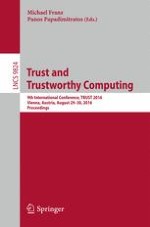2016 | OriginalPaper | Buchkapitel
An Arbiter PUF Secured by Remote Random Reconfigurations of an FPGA
verfasst von : Alexander Spenke, Ralph Breithaupt, Rainer Plaga
Erschienen in: Trust and Trustworthy Computing
Aktivieren Sie unsere intelligente Suche, um passende Fachinhalte oder Patente zu finden.
Wählen Sie Textabschnitte aus um mit Künstlicher Intelligenz passenden Patente zu finden. powered by
Markieren Sie Textabschnitte, um KI-gestützt weitere passende Inhalte zu finden. powered by
